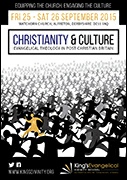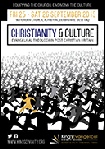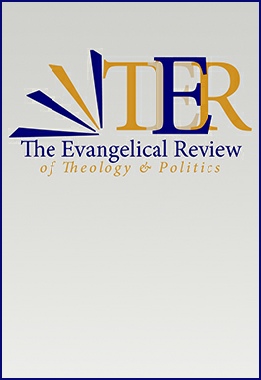THE EVANGELICAL REVIEW OF THEOLOGY & POLITICS
VOL. 3, 2015
 CONFERENCE PAPERS
CONFERENCE PAPERS
‘Christianity & Culture’
EVANGELICAL THEOLOGY IN
POST-CHRISTIAN BRITAIN
25-26 September 2015
Equipping the Church; Engaging the Culture
www : details of Conference
PAPERS
Foreword & Contributors
Brief description of the conference, and notes on contributors.
Uploaded/Published : May 20, 2016 | ERTP Vol 3, 2015, pages, CP1-2
Calvin L. Smith, ‘Introduction to the Conference: Evangelicals in the Public Square – To What Extent Should Evangelicals Be Socially and Politically Engaged?’
KEY WORDS
|| Evangelicalism || Culture || Politics ||
|| Public Theology || Public Square ||
 This paper, which opens the conference, serves as an introductory comment to the current cultural and political situation in the United Kingdom insofar as it affects British Evangelicals. The fundamental premise of this short paper is that British Evangelical faith, on several moral and cultural issues, is increasingly being forced into the private realm. Moreover, even private faith is increasingly being singled out for criticism. The paper concludes with some practical points on how to respond to the new orthodoxy
This paper, which opens the conference, serves as an introductory comment to the current cultural and political situation in the United Kingdom insofar as it affects British Evangelicals. The fundamental premise of this short paper is that British Evangelical faith, on several moral and cultural issues, is increasingly being forced into the private realm. Moreover, even private faith is increasingly being singled out for criticism. The paper concludes with some practical points on how to respond to the new orthodoxy
Uploaded/Published : May 20, 2016 | ERTP Vol 3, 2015, pages, CP3-8
David Williams, ‘Same-Sex Relationships: Final Frontier In The Sexual Revolution?’
KEY WORDS
|| Human Sexuality || Sexual Revolution || Culture || Theology ||
 Prior to the mid-twentieth century, the weight of scholarly opinion interpreted the biblical texts in a manner that suggested homosexuality is a significant aberration and departure from biblical norms on human sexuality, thus majority opinion deemed all same-sex relationships as sinful. Subsequent to the 1960s sexual-revolution much has changed such that many heterosexuals within Western cultures now grant approval of same-sex relationships.
Prior to the mid-twentieth century, the weight of scholarly opinion interpreted the biblical texts in a manner that suggested homosexuality is a significant aberration and departure from biblical norms on human sexuality, thus majority opinion deemed all same-sex relationships as sinful. Subsequent to the 1960s sexual-revolution much has changed such that many heterosexuals within Western cultures now grant approval of same-sex relationships.
This paper explores the definition and trajectory of the 1960s sexual-revolution suggesting that the basis and progress of the sexual revolution since the mid-1960s provides precise philosophical and ethical grounding for the current widespread accommodation of same-sex relationships. Additionally, this paper proposes that the sexual revolution is in essence a rebellion against God’s sovereignty and design of the human race. Therefore the issues involved are fundamentally and thoroughly theological. The paper concludes suggesting a number of likely future scenarios within the trajectory of the sexual revolution.
Uploaded/Published : May 20, 2016 | ERTP Vol 3, 2015, pages, CP9-20
Andy Cheung, ‘Equivalence and Bible Translation: Cultural Concerns and Concepts’
KEY WORDS
|| Bible Translation || Equivalence || Cultural Turn ||
|| Functionalism || Translation Theory ||
 Since the middle of the 20th century, ‘secular’ translation theory has moved from a predominantly linguistic activity to one that incorporates sociocultural elements. The so-called ‘cultural turn’ of around the early 1980s precipitated significant changes in the way translations were conceived and created. The movement from linguistics-oriented study to a more cultural perspective has been pronounced among scholars working in ‘secular’ fields but is much less common in Bible translation circles. To date, Bible translators have exhibited stronger adherence to the older equivalence-based linguistics methods but there are good reasons to consider issues raised by research undertaken in ‘secular’ translation studies. This article explores these issues from the perspective of Bible translation highlighting items relevant to evangelicals. Certain criticisms appear less valid than others but overall, there is much to gain from considering Bible translation from a more cultural and functionalist perspective.
Since the middle of the 20th century, ‘secular’ translation theory has moved from a predominantly linguistic activity to one that incorporates sociocultural elements. The so-called ‘cultural turn’ of around the early 1980s precipitated significant changes in the way translations were conceived and created. The movement from linguistics-oriented study to a more cultural perspective has been pronounced among scholars working in ‘secular’ fields but is much less common in Bible translation circles. To date, Bible translators have exhibited stronger adherence to the older equivalence-based linguistics methods but there are good reasons to consider issues raised by research undertaken in ‘secular’ translation studies. This article explores these issues from the perspective of Bible translation highlighting items relevant to evangelicals. Certain criticisms appear less valid than others but overall, there is much to gain from considering Bible translation from a more cultural and functionalist perspective.
Uploaded/Published : May 20, 2016 | ERTP Vol 3, 2015, pages, CP21-32
Thomas Fretwell, ‘Anti-Semitism, Modern Israel and the Evangelical Church’
KEY WORDS
|| Anti-Semitism || Israel || Theology || Evangelical || Romans || Gentiles ||
 Anti-Semitic sentiment has been increasing in Europe at an alarming rate. The continued crisis in the Middle East has produced a huge spike in anti-Semitic incidents across the globe. Often these incidents are justified under the guise of Anti-Zionism. A segment of the evangelical Church has unfortunately been caught up in this movement. The Church needs to speak with a clear voice when it enters into the conversation. The Church must take into consideration not only the Political and ethical aspects but chiefly the theological aspect of the controversy. The subject of Israel must be treated as a larger theme of Biblical Theology. This paper will endeavour to construct a brief theology of Israel based upon Romans 11:25-29.
Anti-Semitic sentiment has been increasing in Europe at an alarming rate. The continued crisis in the Middle East has produced a huge spike in anti-Semitic incidents across the globe. Often these incidents are justified under the guise of Anti-Zionism. A segment of the evangelical Church has unfortunately been caught up in this movement. The Church needs to speak with a clear voice when it enters into the conversation. The Church must take into consideration not only the Political and ethical aspects but chiefly the theological aspect of the controversy. The subject of Israel must be treated as a larger theme of Biblical Theology. This paper will endeavour to construct a brief theology of Israel based upon Romans 11:25-29.
Uploaded/Published : May 20, 2016 | ERTP Vol 3, 2015, pages, CP33-40
Alex Jacob, ‘Cultural Challenges to Jewish Evangelism: Some insights from the Ministry of CMJ’
KEY WORDS
|| Jewish Evangelism || Contextual Mission ||
|| Cultural Changes || Post-Holocaust Theology ||
 All missionary work is set within a prevailing cultural context. In this paper I reflect upon the insights gained from the work of The Church’s Ministry among Jewish People (CMJ) over the past 206 years in regards to Jewish evangelism.
All missionary work is set within a prevailing cultural context. In this paper I reflect upon the insights gained from the work of The Church’s Ministry among Jewish People (CMJ) over the past 206 years in regards to Jewish evangelism.
Attention is given to the cultural challenges and shifts arising from the re-establishment of the State of Israel (1948), the Shoah (Holocaust), the growth of Messianic Judaism, the changing ‘mission focuses’ within the Church and the legal and cultural climate of ‘post-modern’ Britain. In addition to this work issues around identity and values are explored from a Biblical perspective.
The paper concludes with a renewed sense of confidence in the changeless Gospel message set within the ever-changing landscape of the Jewish community, the Church and wider society.
Uploaded/Published : May 20, 2016 | ERTP Vol 3, 2015, pages, CP41-48
Anthony Royle, ‘An Apocalyptic Hermeneutic for Biblical Hospitality’
KEY WORDS
|| Apocalyptic Hermeneutic || Hospitality || NT use of OT ||
|| Mission || Pluralism || Post-Colonialism ||
 Hospitality is often considered pluralism’s bedfellow. Many scholars have undertook a hermeneutic towards the Scriptures that views hospitality as unconditional and preference for the “other”. This approach to understanding hospitality in Scripture has impacted responses to inter-faith dialogue, homosexuality, migration, and Christian mission. This hermeneutic is imposed upon the Abrahamic narratives and on the ministry and teachings of Jesus, caricaturing the protagonists as inclusive hosts.
Hospitality is often considered pluralism’s bedfellow. Many scholars have undertook a hermeneutic towards the Scriptures that views hospitality as unconditional and preference for the “other”. This approach to understanding hospitality in Scripture has impacted responses to inter-faith dialogue, homosexuality, migration, and Christian mission. This hermeneutic is imposed upon the Abrahamic narratives and on the ministry and teachings of Jesus, caricaturing the protagonists as inclusive hosts.
This paper argues for a hermeneutic which takes into consideration the apocalyptic nature of narratives of Genesis 18 and 19 and their subsequent use in the New Testament. This places emphasis on the reception of the servant of God as “the guest”, where acceptance is reciprocated with blessings, deliverance, and salvation; and the rejection of God’s servant and message results in curses, destruction, and damnation. From this perspective, the Christian response to pluralistic and post-colonial readings of the Abrahamic and Gospel narratives must be challenged, while at the same time, guidance is needed in appropriating hospitality as part of the Church’s mission.
Uploaded/Published : May 20, 2016 | ERTP Vol 3, 2015, pages, CP49-58









 CONFERENCE PAPERS
CONFERENCE PAPERS This paper, which opens the conference, serves as an introductory comment to the current cultural and political situation in the United Kingdom insofar as it affects British Evangelicals. The fundamental premise of this short paper is that British Evangelical faith, on several moral and cultural issues, is increasingly being forced into the private realm. Moreover, even private faith is increasingly being singled out for criticism. The paper concludes with some practical points on how to respond to the new orthodoxy
This paper, which opens the conference, serves as an introductory comment to the current cultural and political situation in the United Kingdom insofar as it affects British Evangelicals. The fundamental premise of this short paper is that British Evangelical faith, on several moral and cultural issues, is increasingly being forced into the private realm. Moreover, even private faith is increasingly being singled out for criticism. The paper concludes with some practical points on how to respond to the new orthodoxy